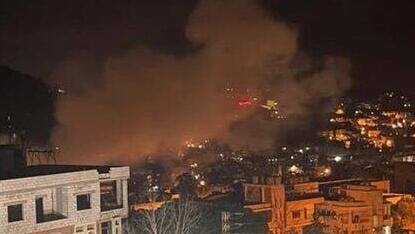Getting your Trinity Audio player ready...
The escalation in the north on Wednesday, which culminated with the rocket barrage on the Northern Command base in Safed that claimed the life of Staff Sergeant Omer Sarah Benjo and injured eight others, comes a day after reports of progress in negotiations to end the war in the north. While the barrages also continue into cities that have not yet been evacuated, Like Safed, Chief of Staff Herzi Halevy issued a threat, and told the commanders at the Lebanese border: "We are focusing on being ready for war in the north."
Read more:
In response to the barrage, the Chief of Staff and the commander of the Northern Command approved a series of airstrikes targeting Hezbollah. Following the shooting, a situation assessment was held this evening at the northern border, where the Chief of Staff held a dialogue with the commanders, telling them: "We are not ending this without returning the residents to Metula and all The communities in the north, at a very high level of security."
The attack on Safed
The peak of the wave of attacks in southern Lebanon came this evening with the reports of four deaths in a significant Israeli attack. The Qatari newspaper "Al-Arabi Al-Jadid" reported on injuries and extensive damage in an attack on a house, and on the closure of institutions in the town tomorrow following the attacks in the area. Later, the Lebanese "Al-Akhbar" newspaper reported that four people were killed in the attack, including a mother and her daughter. A security source in Lebanon told the Saudi newspaper that the house that was attacked belongs to a family that has no connection to Hezbollah.
In an unusual move, Hezbollah did not claim responsibility today, but they did announce the deaths of three of their members: Hassan Ali Najam, Ibrahim Ali al-Dabaq, and Ibrahim Hussein al-Mastrah. The organization has reported a total of 196 deaths among its activists since the beginning of the war.
In Israel, efforts are being made, along with various mediators, to fully implement Resolution 1701. This resolution called for the deployment of UNIFIL forces and Lebanese army forces in the southern area of Lebanon, south of the Litani River. However, it is uncertain whether this implementation will resolve all the disputes between Israel, Lebanon, and Hezbollah.
13 points of contention
There are disagreements between the countries regarding certain points within the resolution, and there are additional disputes unrelated to the resolution that could affect attempts to regulate the northern border. The latest proposal from France, published recently, aims to address or at least phase out these disputes as well.
It's important to remember the decision, passed by the UN Security Council in 2006, effectively ended the Second Lebanon War between Israel and Hezbollah. According to this decision, Hezbollah was expected to withdraw north of the Litani River.
Evacuating the wounded in southern Lebanon
Lebanon contends there are 13 different points along the Blue Line, - the current Israel-Lebanon border, perceived by Beirut as sovereign Lebanese territory that is currently being held by Israel and is to be resolved in future negotiations. Those 13 points are all along the border, from the Rosh Hanikra lookout and eastward, all the way to the area between the Israeli town of Metula and the Lebanese village of Al-Wazzani.
One of the main points Hochstein is sure to reference is the Land Terminus point, known as B1. This border point marks the final land connection between Israel and Lebanon in the western sector along the Mediterranean Sea. Lebanon seeks Israel's withdrawal from this strategically significant area, as it holds both geographical and military importance. Moreover, this point also determines the maritime border between the two countries.
Another point of contention is Ghajar, also Rhadjar, an Alawite-Arab village on the Hasbani River. While technically split in half, Israel currently controls all of it, and part of Hochstein's assignment would be dedicated to laying the groundwork to convince Israel to surrender its northern section to the Lebanese.
Meanwhile, Hezbollah has made statements emphasizing that the Lebanese front stands in solidarity with Gaza and that dialogue will not take place until attacks in the Strip cease. Secretary General Hassan Nasrallah addressed Resolution 1701 in his recent speech, stating, "The enemy (Israel) is not in a position to dictate terms to Lebanon. They are weak and in crisis. We urge the Lebanese side to establish additional conditions alongside the implementation of Resolution 1701. Lebanon holds a position of strength and has the ability to set the terms."






